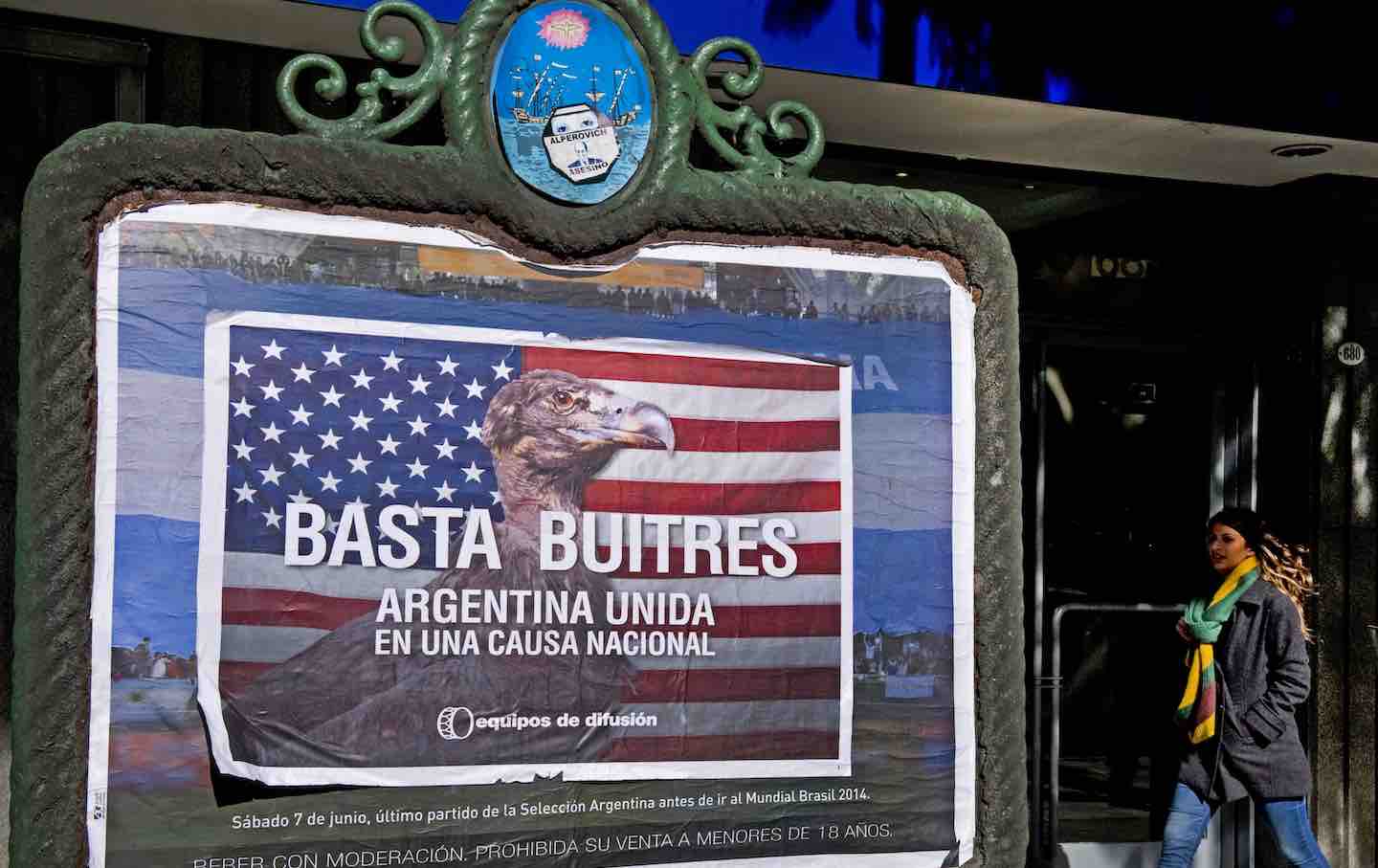How the US Courts Rewrote the Rules of International Trade
March 3, 2025
Shaina Potts’s Judicial Territory examines how the American legal system created an economic environment that subordinated the entire world to domestic business interests.
Brett Christophers

A woman passes by posters that read “Enough Vultures—Argentine united in a national cause” in Buenos Aires, 2014.
(Alejandro Pagni / AFP via Getty Images)
Consider the following two stories involving legal disputes between American companies and foreign governments.
In 1919, the ocean steamer The Pesaro sailed from Genoa, Italy, for New York City. Built in Germany for a German shipper and formerly named the SS Moltke, the steamer had been seized by the Italian government in 1915 after Italy entered World War I. On board for its departure to America four years later were 75 cases of artificial silk owned by a company incorporated and based in the United States called the Berizzi Brothers. When The Pesaro arrived in New York after two weeks at sea, however, the Berizzi Brothers cried foul: Only 74 cases of silk were delivered. One had been lost or damaged in transit.
Eighty-two years later, a dispute on an altogether larger scale began. In 2001, with Argentina’s economy mired in recession, the country defaulted on around $93 billion of government debt, in what was then the largest sovereign debt default in history. Though a portion of that debt was owed to foreign governments, the default primarily involved private bondholders such as institutional investors. Most of these creditors would eventually agree to restructure the debt for cents on the dollar (thus booking losses), but a minority of the debt holders refused to accept this “haircut.” Like the Berizzi Brothers eight decades earlier, these holdouts, too, were based in the United States, namely a group of Wall Street “vulture funds” that had invested in the debt at distressed prices.
Beyond the fact that both cases pitted American firms against foreign governments, what links these stories is that the firms in question sought legal redress for their grievances. Not only that, but they sought this redress specifically in American courts, and thus by appeal to US law. The Berizzi Brothers sued for $250 in damages; the vulture-fund owners of the Argentinian debt sued for full face value plus interest.
The Berizzi Brothers’ case ended up in the US Supreme Court, and in 1926 the company lost, which is to say that the Italian government won. The Pesaro was owned and operated by Italy, and it was well established under US law that foreign governments (and their oceangoing vessels) were immune from suit in domestic courts. Yes, the Italian government was engaged in this case in a commercial activity, but it was so engaged, the court ruled, in a public rather than private capacity and with a public purpose.
But the Argentine government would not prove so fortunate, twice finding itself on the receiving end of negative legal judgments in its battle with the vulture funds. The first was when the US courts decided in 2012 in favor of the creditor holdouts, ruling that the full bond value was indeed due. The second followed Argentina’s subsequent decision—highly unusual among sovereign debtors in recent decades—to stand firm and continue to not pay up. While the US courts could not directly make Argentina pay, they could and did make life extremely uncomfortable, issuing rulings from 2012 to 2014 that indirectly forced the Argentine government’s hand by prohibiting it from making payments to other creditors unless it paid the holdouts first, and by prohibiting anyone anywhere in the world except Argentina from helping the country make such payments.
More:
https://www.thenation.com/article/culture/shaina-potts-judicial-territory/